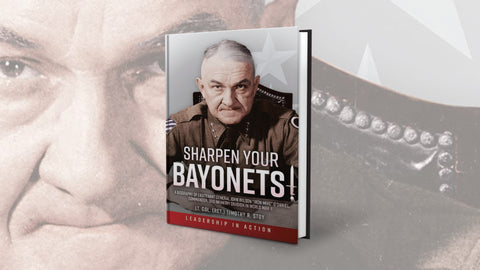
Book Review: Sharpen Your Bayonets: A Biography of Lieutenant General John Wilson “Iron Mike” O’Daniel
“You are about to embark on a crusade, a crusade as important to the world as was the great crusade years ago when it became necessary to eliminate certain people, the Barbarians, who stood in the way of Christianity. So today we have something standing in the way of the peace of this world and the enjoyment of freedom. The Nazis. When you come face to face with him, don’t think of him as a person or a human being, but as something in the way of this peace and freedom and eliminate him at once.”
No, that was not Gen. George S. Patton Jr. speaking. However it is a reminder to us that “Old Blood and Guts” had his share of disciples and kindred spirits. In this case, it was Col. John W. O’Daniel, who would become famously known as “Iron Mike” to his men, addressing Task Force 168 before unleashing that unit on Vichy French costal defenses west of Algiers in November 1942.
On the 22nd he was promoted to brigadier general. On June 25, 1943 he went from Invasion Training for the upcoming landings on Sicily to deputy commander of the unit with which his name is most associated, the 3rd Infantry Division.
Through much of Sharpen Your Bayonets! , author Timothy R. Stoy apologetically confesses the limits of his source material and how it leaves much of his biography of this hitherto overlooked commander to speculation.
Still, he presents enough—including plenty from the general himself—to present a classic career of a top-notch administrator, a strict disciplinarian, an equally strict believer in Russian general Aleksandr Suvorov’s philosophy of “train hard, fight easy,” and an aggressive combat commander, all elements in a lifetime of successful leadership.
Overcoming his fears on his first day of battle at the start of the St. Mihiel offensive on Sept. 12, 1918, he went on to distinction in World War II and as I Corps commander in Korea.
The author does note, however, that his transfer of hatred from Nazism to communism gave him a “one-size-fits-all” approach that fell short when advising the French army and training the Army of the Republic of Vietnam. In sum, however, O’Daniel’s life and times were consistently Pattonesque.
